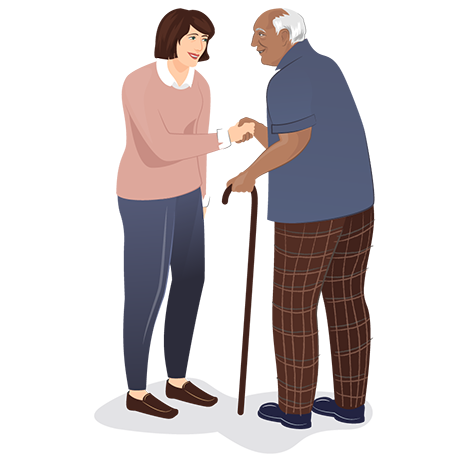
Dealing with Grief and Loss of an Elderly Companion.



Speak to one of our experts
Our friendly experts are here to help from 9am to 7pm, 7 days a week.
Understanding Grief and Bereavement
Grief is the intense sorrow or emotional distress triggered after losing someone close to you.
It often manifests both psychologically (longing, sadness, guilt) and physically (fatigue, pain, and nausea). Acute grief gradually gives way to integrated acceptance as we adapt to loss. Complicated factors like a partner’s long illness or unexpected death can prolong acute grieving states.
People providing end-of-life care to their partners tend to encounter consuming grief. This blog explores this difficult subject and offers practical guidance and advice.
Coping With the Loss of a Spouse or Companion
Losing one’s life partner leaves an empty space that can impact one’s daily life and well-being. The intimacy, familiarity, and sharing of memories and dreams with another, can vanish, leaving feelings of loss and loneliness. These complex feelings can lead to secondary physical and mental health complications.
Rates of mortality, depression and chronic illness increase in surviving elderly partners.
Struggling seniors are also confronted with new burdens, like household maintenance or bill paying, which may have previously been supported by their spouse.
Challenges for Elderly Individuals Losing a Loved One
Experiencing the loss of a cherished companion later in life brings unique hurdles. Elders must grieve their soulmate who supported them through so much, after what could be 50+ years together. Retirement dreams and plans have to shift and fewer protective factors exist in this older age group. Making major lifestyle adjustments due to medical issues or isolation adds practical strains, compounding sadness.
These layered challenges contribute to higher depression, suicidal thoughts, hospitalisation risks and mortality among the elderly grieving a spouse’s death.
Benefits of Live-In Care and Companionship
Quality live-in care provides compassionate support, easing the heavy burden of this painful loss. Experienced caregivers handle household duties like cleaning or can support with transport to appointments. Nutritious meals catering to specific diets and choices provide comfort along with medication monitoring, which can go awry in those distracted by loss.
Veteran caregivers know emotional distress manifests uniquely in elders – attentive listening and conversations create connections during grief. Maintaining cherished hobbies and community links helps maintain meaningful living at a difficult time.
Live-in caregivers empower safer, nourished living, avoiding premature institutionalisation. Their round-the-clock presence supplies both physical assistance and empathetic companionship during a period of monumental loss.
Moving Forward After a Difficult Loss
Healing from losing a spouse or companion poses multifaceted challenges late in life. While the grief journey remains nonlinear, certain strategies help mitigate adverse outcomes during bereavement. Prioritising self-care and maintaining health supports resilience. Joining support groups validates experiences whilst building connections.
Continuing meaningful rituals or honouring legacies keeps loved ones’ spirits alive. Quality live-in care assists this adjustment through holistic, compassionate guidance to help write the next life chapters.
Choose The Live In Care Company
Choosing a live-in care provider for your loved one is a significant and sometimes challenging decision. By thoroughly identifying your loved one’s requirements, finding a trustworthy agency, conducting comprehensive interviews, and deciding as a family, you can ensure that you choose a caregiver who will provide high-quality, compassionate care.
Learn more about how The Live In Care Company can provide the right support and resources for all your loved one’s needs.





